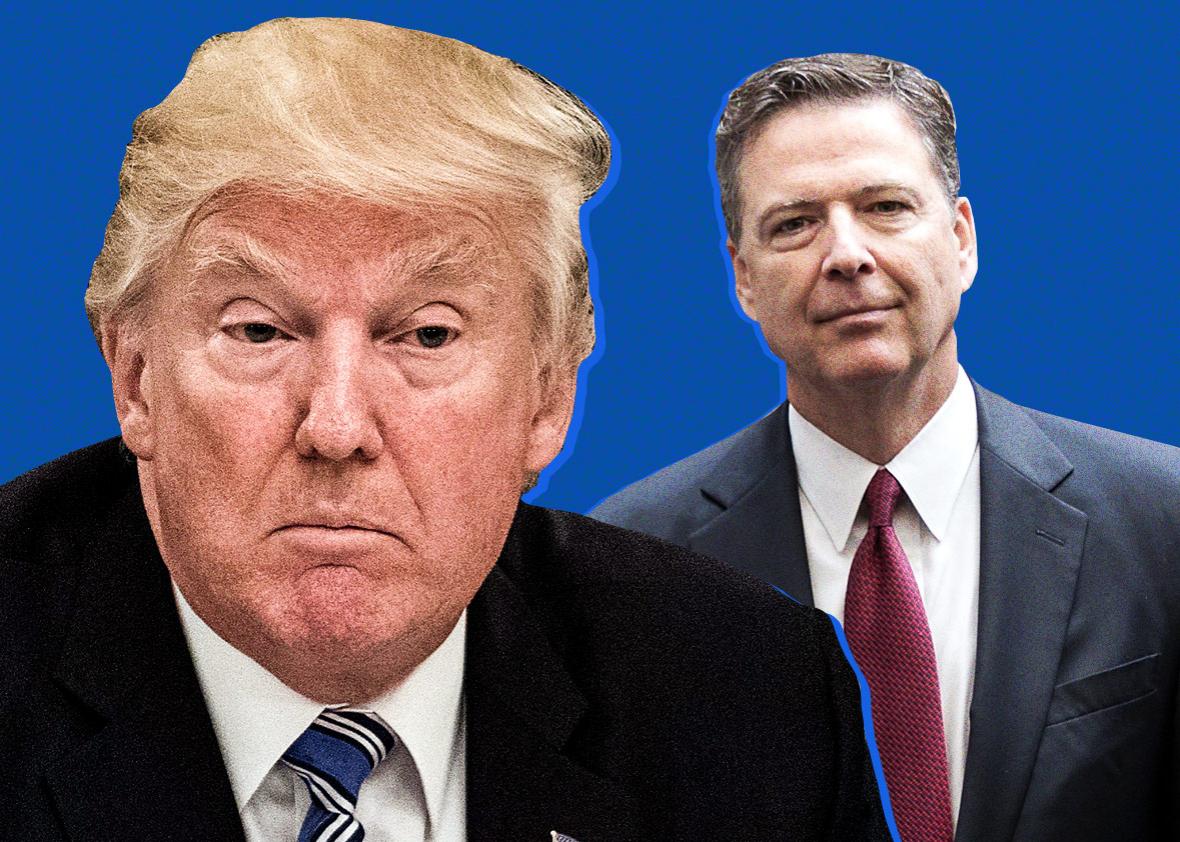Last month, when President Trump fired FBI Director James Comey, conservatives parroted the White House cover story: that Trump had terminated Comey based on the recommendations of Attorney General Jeff Sessions and Deputy Attorney General Rod Rosenstein. That story soon collapsed, leaving Trump’s apologists scrambling for other excuses. In the last week or so, some of them have settled on a new theory. They accept that Trump fired Comey because of the FBI’s Russia investigation. But Trump wasn’t trying to stop the investigation, they insist. He was just frustrated that Comey wouldn’t tell the public the truth: that Trump wasn’t personally under investigation.
The new theory has lots of problems, but let’s start with the simplest one. What Trump supposedly wanted from Comey, under this theory, is exactly what Rosenstein and Sessions deemed a firing offense: public statements by the FBI director, without Justice Department approval, about an investigation. The new rationale for firing Comey is a 180-degree reversal from the old rationale for firing Comey.
Rosenstein’s May 9 memo, solicited by Trump to justify the firing, said Comey had usurped the Justice Department’s authority by making public statements in July 2016 about Hillary Clinton’s conduct. The FBI director’s job, according to Rosenstein, was to relay FBI’s findings to DOJ and let the department decide what to do or say. Sessions forwarded Rosenstein’s memo to Trump. Trump, in turn, issued a letter firing Comey and citing the memo as his basis.
Conservatives embraced this story. In National Review, legal writer Andrew McCarthy called Rosenstein’s memo “well crafted” and said it would “be tough for Democrats to argue convincingly that Trump fired Comey for any other reason.” On Fox News, Newt Gingrich agreed with Rosenstein that Comey “violated the rules of the Justice Department.” When a president “gets a letter like that from a career professional,” Gingrich said of the memo, “How could he do anything [but] accept the letter?”
The story soon fell apart. Trump told NBC’s Lester Holt that he had made the firing decision before receiving the memo. Meanwhile, Trump told Russia’s foreign minister that by firing Comey, he had relieved “pressure” on the U.S.–Russia relationship. And Comey’s allies began to leak memos that detailed Trump’s efforts to get Comey to ease up on Russia-related matters. According to Comey, Trump had asked him to lay off former National Security Adviser Michael Flynn and to “lift the cloud” of the Russia investigation.
Conservatives groped for a benign way to explain these facts. On June 10, shortly after Comey testified about Trump’s backstage pressure campaign, McCarthy shifted the rationale to argue that Trump had fired the FBI director out of “exasperation over Comey’s refusal to tell … the world” what he had told Trump privately: that the president “was not under investigation.”
This was a useful argument for Republicans. It gave them a way to spin Trump’s Russian fixation as an interest in truth, not obstruction. Others on the right followed McCarthy’s lead. On Sunday, Newt Gingrich told ABC’s Martha Raddatz that Trump had fired Comey “because Comey would not say in public what he was saying to Trump in private, which is, ‘You’re not being investigated.’ ” On Meet the Press, Sen. Marco Rubio agreed that Trump “has tried to get multiple people to say that publicly, because they have told him that apparently, in private.” Trump’s demands for such statements, Rubio argued, weren’t obstruction because they didn’t impede the FBI’s work.
Public assurance from the FBI director that you aren’t personally under investigation, even if your campaign is, might sound like a reasonable thing to ask for. But it’s exactly what Rosenstein’s memo said an FBI director shouldn’t do. So if Trump did fire Comey for this reason, there are only three possibilities: Trump didn’t read, didn’t understand, or ignored the memo on which he claimed to base his decision. Either way, he lied.
McCarthy offers the best version of the exasperation defense. He argues that Comey, by disclosing on March 20 that Trump’s campaign was under investigation, had already crossed the line of publicly implicating the president. But that argument misses the crucial distinction. Comey issued his March 20 statement only with DOJ’s explicit approval—exactly what Rosenstein said an FBI director had to obtain. Furthermore, when Trump privately lobbied Comey to clear his name, Comey duly referred the president to DOJ. Instead, Trump fired Comey. It was the president, not the FBI director, who tried to bypass the Justice Department.
In any event, McCarthy is giving Trump too much credit. There’s no evidence that the president thought through any of this, beyond his well-reported rage at the Russian “cloud” and at Comey for not getting rid of it. Trump’s apologists, likewise, are just trying to get the president out of a jam. On TV this weekend, they were out in force, quoting Rosenstein’s memo in one breath and defying it, via McCarthy’s argument, in the next. They’re not looking for truth. They’re looking for excuses.
